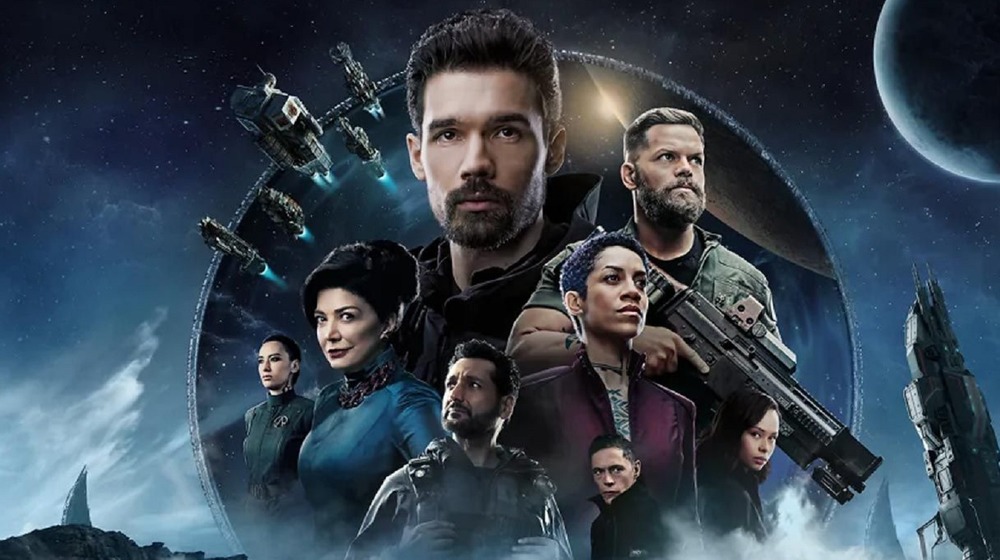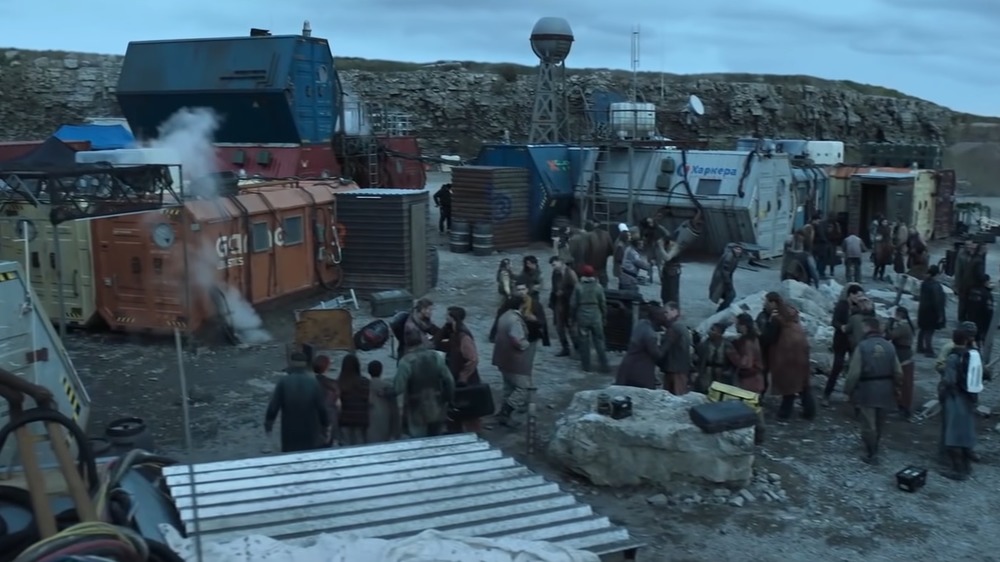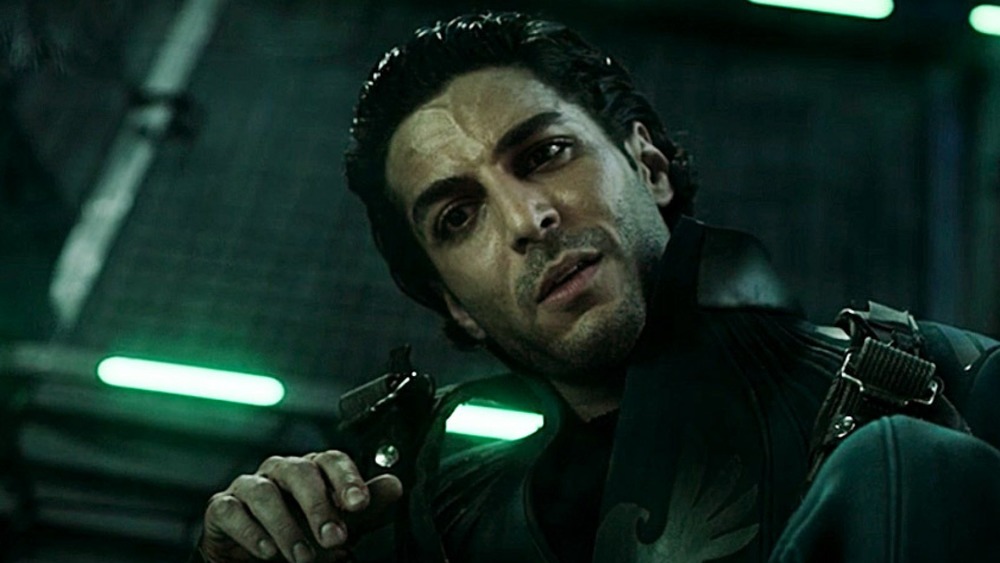The Ending Of The Expanse Season 4 Explained
Set in a future where humans have spread out across the solar system and find themselves locked in ongoing conflicts over resources, The Expanse is a soaring sci-fi epic of a show adapted from a series of novels of the same name by James S.A. Corey. The first three seasons, which aired on SyFy, focused on the ongoing investigation into an alien scourge referred to as "protomolecules," which led to the discovery of a hub of portals to inhabitable systems all over the universe. The fourth season, which was the first to air on Prime Video, sees humanity take its first steps into the uncharted territories beyond the portal while political battles continue back home.
The hotly anticipated fifth season (which, according to Redditors who have read the book series, "is going to be insane") is coming on December 16. But before we see the conclusion to season 4's big cliffhanger, let's backtrack and take a look at the events that lead us there. This is the ending of The Expanse season 4 explained.
An end to the trouble on Ilus
One of the main storylines of season 4 is the conflict on the newly discovered planet called Ilus, or New Terra. A group of Belter refugees (people who live a hardscrabble life in our solar system's asteroid belt) has colonized the seemingly hospitable planet. However, they are quickly set upon by a UN-backed research group called Royal Charter Energy (RCE) who wants to drive them from their new home.
While Ilus wasn't inhabited when the Belters and RCE arrived, it clearly was at one time. James Holden (Steven Strait) is sent to the planet to monitor the situation. But when he arrives, alien structures that appear to be powered by the presence of the protomolecule spring to life, threatening the Belter colonists and RCE crew alike. Holden has some protomolecule traces in him, which is what allows him to see the specter of Joe Miller (Thomas Jane), who was subsumed into the powerful blue goo earlier in the series. The specter is the protomolecule coming to Holden in Miller's form, but eventually what's left of Miller's consciousness gains enough control to act independently, and he is able to help Holden put an end to the chaos on Ilus.
Miller leads Holden to an ancient alien device (no, not those Ancient Aliens) that is leftover from an intergalactic war long, long ago. With the help of Elvi Okoye (Lyndie Greenwood), a geologist with Royal Charter Energy, Holden delivers Miller to the device, which shuts down the structures on Ilus. It's a victory for humankind on the frontiers of space, but it's unlikely to be the last alien threat the species faces.
Humanity faces an unknown alien threat
While a turf war is playing out on Ilus, a good old fashioned political dogfight is happening on earth. Chrisjen Avasarala (Shohreh Aghdashloo), the current UN Secretary-General (a.k.a. President of Earth) is facing a fierce challenge for leadership from Nancy Gao (Lily Gao). One of the key differences between the two women is the issue of human expansion into the wider universe.
Avasarala has a conservative stance on the issue and isn't keen to have humans flooding through the intergalactic hub discovered at the end of season 3. Gao, meanwhile, wants to pursue expansion. She wins in the end, unseating Avasarala and ushering in a new age of human exploration.
However, Avasarala's conservatism didn't come from nowhere. She saw the chaos of the protomolecule up close and knows that there are likely other threats to humanity in the other systems — and she's not the only one with that hunch. After she helps AI Miller extinguish himself, Elvi has a powerful vision caused by her interaction with the alien tech. She's not sure exactly what it means, but she can tell it portends of some kind of malevolent and formidable force that is soon to collide with humanity. Holden knows exactly what she's talking about because he had a similar vision at the end of season 3 when he opened the protomolecule hub. For all the human conflict that goes on in The Expanse, the threat of inscrutable alien forces is almost constantly hanging over the protagonists, similar to the White Walkers from Game of Thrones.
Before they can get to that esoteric threat, though, there is some very serious human-made danger about to be unleashed.
A new human threat to peace emerges
Throughout the season, Martian Marine Bobbie Draper (Frankie Adams) has been witnessing her planet's decline. Now that portals to potentially thousands of inhabitable planets have opened, the project of taming and terraforming Mars has lost its appeal. With the Martian economy in the toilet, Draper begins working for a crooked cop selling Martian tech on the black market.
As it turns out, one of the buyers is a space insurgent named Marco Inaros (Keon Alexander), a Belter who believes his people have been brutally oppressed by the Inners (people who were born on planets, like Martians or Earthlings). Marco plans to launch a potentially catastrophic attack on Earth by crashing asteroids protected by Martian stealth technology into the unsuspecting planet. In a twist, we find that he's being assisted by Filip (Jasai Chase Owens), who just so happens to be the son of Marco and Belter engineer Naomi Nagata (Dominique Tipper), a protagonist on the show since season 1. Naomi referenced the existence of her son previously in the series, and by the end of season 4, we now see that he's emerging as one of the chief antagonists of the series heading into season 5.
And that's where The Expanse leaves off: impending mass destruction that could wipe out a significant portion of human life on earth. That's quite the cliffhanger — or rather, an asteroidhanger. Thankfully, the fifth season of The Expanse will be arriving on Prime Video on December 16.



